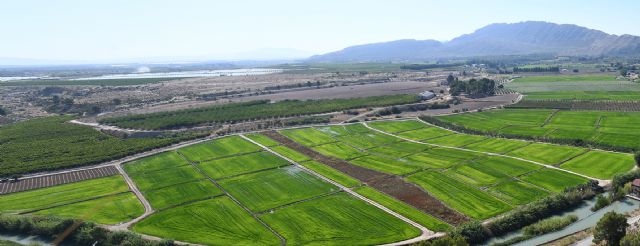| It simplifies the management of the CAP, allows the control of all the aid requested and represents a boost towards precision agriculture | The General Directorate of Common Agricultural Policy of the Ministry of Water, Agriculture, Livestock, Fisheries and the Environment, in collaboration with the Murcian Institute for Agricultural and Food Research and Development (IMIDA), has participated since 2019 in a pioneering initiative in the national level consisting of the use of monitoring technologies to control files benefiting from aid from the Common Agricultural Policy (CAP). This technology, based on the use of satellite images and images captured by drones, allows the percentage of controls carried out on aid files to be expanded, from the current 5 percent to 100 percent of aid declarations.
In addition, the monitoring offers the possibility of carrying out the controls throughout the year, thus eliminating the temporary period to which it had to adjust until now. Monitoring controls, which will be mandatory for the entire national territory as of next year 2021, are currently focused on the Region of Murcia in the cultivation of rice, and are carried out using techniques based on the biophysical indices of the crop itself. The actions carried out include monitoring control through Artificial Intelligence (specifically through Machine Learning), as well as the development of an algorithm based on this technique, which in the first instance will be used to detect rice cultivation, but which it is easily adaptable for the detection of any other type of culture. Likewise, an explanatory video of the process has been edited, accessible through the following link: https://youtu.be/qRTZLNBjEek?list=PLYinObBhdgZ1huHqmnwR5rS3Oo_o5eil2. The Region of Murcia is thus part of the so-called Advanced Monitoring Group (GAM), created by the Spanish Fund for Agricultural Guarantee (FEGA) with the aim of joining forces and providing the necessary resources to carry out the aforementioned controls. In addition to monitoring, the Ministry has been betting on the application of new technologies to agricultural tasks in order to improve the productivity of crops and reduce the environmental impact. In this sense, it is worth highlighting the services offered by the Ministry thanks to the Murcia Agricultural Information System (SIAM) which, in addition to providing free and open agrometeorological data and reports, provides personalized irrigation programs to anyone who requests it from through its website (siam.imida.es). These projects, carried out by IMIDA, are explained and developed in different sessions within the 'Precision Agriculture' Workshop, organized by ENAE Business School. The director of IMIDA, Víctor Serrano, highlighted during his participation in the first session of this virtual workshop the importance of betting on projects that promote the introduction of new technologies in agriculture, since "these actions are translated, finally, into a optimization in the use of resources and a notable improvement in the productivity, quality and sustainability of agricultural production ".


